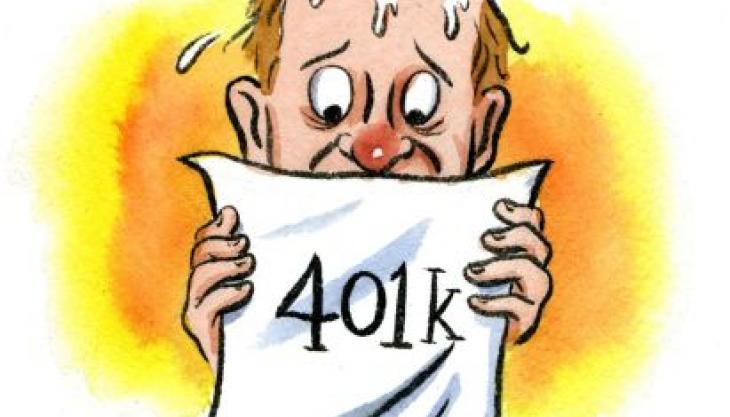Chapel Hill Lawyer Explains: What Happens to Your 401K During Bankruptcy?
Submitted by Rachel R on Thu, 06/27/2013 - 11:22pm

Image Source: newsday.com
If you’re one of the lucky North Carolinians who has been able to hold a long-term job with retirement benefits, you’ve probably built up a nice 401k over the years. So, now that you find yourself in serious financial trouble and considering bankruptcy, it’s only natural to wonder what will happen to your 401k during the process. After all, you worked a long time to build up some sort of nest egg for your family and you’re going to depend on that money at some point.
When Congress wrote the 2005 bankruptcy reform laws, they specifically wrote a provision into the legislation that protects your 401k and other qualified retirement accounts. They sent a clear message to the American public: People need their retirement savings. Lawmakers understood that, without letting people keep their retirement funds intact, most would likely end up needing public assistance, which would cost the government more in the end.
As you know, there are two types of personal bankruptcy. During a Chapter 7 bankruptcy, a bankruptcy trustee liquidates most of your non-exempt assets, then divides the proceeds among your creditors. If you file a Chapter 13 bankruptcy, the judge who oversees your case will work with you to come up with an acceptable repayment plan. No matter which chapter you file, your 401k plan is safe under bankruptcy law and here’s why:
Chapter 7 Bankruptcy
Federal law protects almost all tax-exempt retirement funds during bankruptcy. This is true even if you are using state or federal bankruptcy exemptions. That includes things like a 401k, 403b or profit-sharing plan. For the most part, the exemption amount is unlimited, which means that you get to keep the entire amount that’s in your account.
Chapter 13 Bankruptcy
Under the guidelines of a Chapter 13 bankruptcy, you are allowed to keep your property. That means your retirement accounts are safe and exempt during the bankruptcy process. This is welcome news, considering the fact that creditors are traditionally allowed to seize the funds from your checking and savings accounts.
Image Source: southcoastinvest.com
The 401k Don’ts
Now that you understand how federal law protects retirement accounts during the bankruptcy process, it’s important to know what not to do with your 401k when you are considering filing. Here are the three big 401k don’ts:
- Don’t Use a 401k to Pay Off Debt: You may be thinking that it’s a good idea to take out a loan or withdraw money from your 401k to pay off debt and avoid filing for bankruptcy. Most experts agree this is never a good idea. Think about it. Your 401k is protected during the bankruptcy process, so you can file without doing any damage to your retirement funds. If you cash in your 401k early, you have to pay penalties. If you end up filing for bankruptcy anyway, it’s always best to do it with a solid retirement fund sitting safely in the bank.
- Don’t Cash in Your 401k: This is a common mistake many people make and it’s often because they are trying to get money to pay off debt. However, once you take the money out of your 401k and put it into some other type of account, it will automatically lose its exempt status. That means your nest egg is no longer safe from creditors if you file for bankruptcy protection.
- Don’t Put a Lot of Money into Your 401k Just Before Filing Bankruptcy: Another common mistake people make is to transfer a lot of money into an exempt retirement fund just before submitting a petition for bankruptcy protection. For example, you might be considering emptying out your savings account, which is non-exempt during bankruptcy, and putting it into your 401k, which is exempt. Never transfer money like this without consulting your local North Carolina bankruptcy attorney first. If the court thinks you were trying to defraud a creditor, you can lose the exempt status of your retirement fund or be denied a bankruptcy discharge altogether.
Image Source: money.howstuffworks.com
If you’re in financial trouble and wondering if either Chapter 7 or Chapter 13 bankruptcy can help you, it’s time to consult with an experienced Chapel Hill bankruptcy attorney. Take charge of your future; don’t let your questions go unanswered another day.
Dedicated to helping residents of North Carolina find the best solutions to their debt problems. Don’t waste another day worrying about your debt. Call +1-833-627-0115 today to schedule a free initial consultation to discuss your bankruptcy options.
Debts Hurt! Got debt? Need help? Get started below!
Serving All of North Carolina
- Bankruptcy Attorneys Raleigh NC (North)
- Bankruptcy Attorney Fayetteville NC
- Bankruptcy Attorney Durham NC
- Bankruptcy Attorneys Wilson NC
- Bankruptcy Attorneys Greensboro NC
- Bankruptcy Attorneys Southport NC
- Bankruptcy Attorneys Wilmington NC
Bankruptcy Attorneys Raleigh NC (North)
6616 Six Forks Rd #203 Raleigh, NC 27615 North Carolina
Tel: (919) 847-9750

Bankruptcy Attorney Fayetteville NC
2711 Breezewood Ave Fayetteville, NC 28303 North Carolina
Tel: (910) 323-2972

Bankruptcy Attorney Durham NC
1738 Hillandale Rd Suite D Durham, NC 27705 North Carolina
Tel: (919) 286-1695


Bankruptcy Attorneys Greensboro NC
2100 W Cornwallis Dr. STE O Greensboro, NC 27408 North Carolina
Tel: (336) 542-5993

Bankruptcy Attorneys Southport NC
116 N Howe St. Suite A Southport, NC 28461 North Carolina
Tel: (910) 218-8682

Bankruptcy Attorneys Wilmington NC
116 N. Howe Street, Suite A Southport, NC 28461 North Carolina
Tel: (910) 447-2987
